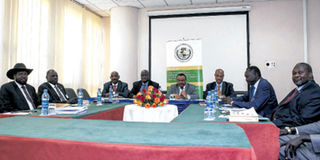South Sudan peace talks collapse again as leaders fail to reach deal

Ethiopian Prime Minister Hailemariam Desalegn (centre), South Sudan President Salva Kiir (left) and rebel chief Riek Machar (right) in peace talks in Addis Ababa on March 3, 2015. The two leaders on March 6, 2015 failed to reach an agreement, missing a March 5 deadline set by regional bloc Igad. PHOTO | ZACHARIAS ABUBEKER | AFP
What you need to know:
- President Kiir and former Vice President turned rebel leader, Dr Machar, agreed on February 1 to conclude negotiations on the formation of a transitional government of national unity and begin a process of healing and reconciliation.
- The conflict is believed to have been triggered by power struggle between the two leaders and sharing of oil resources, with the conflict also reportedly taking an ethnic tone as the two major tribes, the Neur and Dinka, battled for supremacy.
- South Sudan ambassador to Kenya Mr Mariano Ngor said the South Sudanese government would assist them tackle some of their grievances such as demarcation of borders, sharing of oil and resolution of the conflict affecting their people.
South Sudanese peace talks collapsed on Friday after main protagonists President Salva Kiir and rebel leader Riek Machar failed to agree on a transitional government of national unity.
Ethiopia Prime Minister and the chairperson of the Igad Assembly to the people of South Sudan, Hailemariam Dessalegn, said he was disappointed that the talks had collapsed, missing a March 5 deadline to reach a breakthrough.
President Kiir and former Vice President turned rebel leader, Dr Machar, agreed on February 1 to conclude negotiations on the formation of a transitional government of national unity and begin a process of healing and reconciliation.
Kenya, a member of Igad, was party to the talks and President Uhuru Kenyatta hosted other heads of state and even travelled to the civil war-torn country several times to try and end the stalemate.
“President Kiir and Dr Riek Machar agreed that they would come to an agreement by March 5. That deadline has been missed. Talks continued this morning, past the deadline. I regret to inform you that the talks did not produce the necessary breakthrough,” said the Ethiopian Prime Minister in a message to the people of South Sudan.
VIOLENCE
Violence broke out in South Sudan in December 2013, two years after independence from Sudan, with the fighting claiming thousands of lives.
The conflict is believed to have been triggered by power struggle between the two leaders and sharing of oil resources, with the conflict also reportedly taking an ethnic tone as the two major tribes, the Neur and Dinka, battled for supremacy.
Mr Dessalegn said the consequences of inaction was the continued suffering of the people of South Sudan.
“This is unacceptable, both morally and politically. On behalf of the people of Ethiopia and the people of the Igad region, we stand with you at this difficult and disappointing time. We remain hopeful that the promise of peace will be fulfilled in the near future,” he said.
The Ethiopian leader said both President Kiir and Dr Machar had assured Igad member states that they were committed to peace.
“At the same time, there are individuals on both sides who continue to beat the drums of war. This cannot be right. There can be no justification for the continuation of this conflict. The war must end now,” he said.
DIFFICULT COMPROMISES
“On March 3, I urged President Kiir and Dr Machar to make the necessary and difficult compromises to move out of this crisis. I asked them to be courageous in offering compromises and alternatives, rather than only reiterating old positions. Both regional and world leaders joined this call. Unfortunately, as the missed deadline shows, our pleas have not been heeded,” he added.
Meanwhile, eight tribal rebel commanders on Thursday downed their arms and joined government ranks following an amnesty offered by President Kiir last week.
The commanders from the Collo community which fought in Upper Nile State alongside the SPLM/A rebels led by Dr Machar, are expected to return to Juba where they will be received by President Kiir.
South Sudan ambassador to Kenya Mr Mariano Ngor said the South Sudanese government would assist them tackle some of their grievances such as demarcation of borders, sharing of oil and resolution of the conflict affecting their people.
“The country is still in the process of drafting a new and permanent constitution and some of the issues that they have raised are likely to be captured there,” he said.
President Kiir had already assured the defecting party that their grievances will be considered once they joined the government side.




